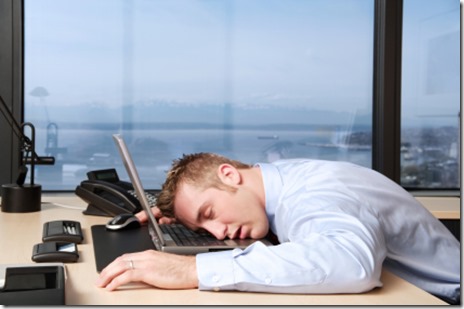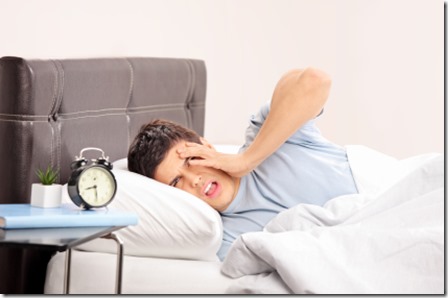8 Ways To Speak When You’re Tired and Jet Lagged
I delivered a full-day presentation training session to a group of 20 people in Arizona last month.
The day before the training, I flew from my home near New York City to Phoenix, via Detroit. The flight from New York City to Detroit was delayed by five hours. I missed my connection. I was rebooked on a later flight, which was also delayed by two hours. I finally got to Phoenix at 1:00 a.m. and still had to drive the two hours to Tucson.
When I got to the hotel, the reservation clerk assigned me a room and gave me the key card. As I swiped the key, I heard a man’s voice inside the room scream, “HEY!” The clerk had given me someone else’s room.
With all of those travel glitches, I barely got four hours of sleep before having to present. As a presentation trainer who is supposed to be a model of good public speaking, I simply cannot use “lack of sleep” as an excuse for a subpar training. Which made me wonder: what can a speaker do to perform better after a night with little sleep?
1. Drink Caffeine, But Not Too Much
According to Dr. Jeffrey Durmer, chief medical officer at FusionSleep Center in Atlanta whose comments were summarized by WebMD, “two cups of coffee…will give you about as much alertness as you’re going to get.”
2. Eat The Right Foods
Michael Breus, a PhD who writes WebMD’s sleep blog, was quoted in the same WebMD article. His advice? Emphasize protein-rich meals and avoid heavy meals and carbs.
3. Stay Hydrated
Journalist Wendy Rose Gould, writing for the Livestrong website, advises you to “Stay hydrated by drinking water throughout the day. Even mild dehydration can add to your fatigue.”
4. Exercise
According to Dr. William Kohler of the Florida Sleep Institute, quoted by Men’s Health, some light cardio can help. “Exercise helps develop adrenaline release, which makes us more alert,” he says.
5. Take a Power Nap
Okay, so you can’t sleep during your presentation. But if you have a one-hour lunch break, try to find a quiet room to nod off in for a few minutes. Just make sure to set your alarm, or you’ll have to resume your talk before you’ve had a chance to wipe the drool off your bottom lip. Some sleep experts recommend chugging some coffee before your nap, since the caffeine takes about 20 minutes to kick in and will be working for you when you arise from your brief slumber.
6. Don’t Announce You’re Tired
Sleep deprivation can have similar effects to intoxication, so it’s no surprise that I occasionally mix up my words when I speak on little sleep. I’m known to say things like, “So now let’s focus on body language and how it affects the way your people are received by communications.” That doesn’t happen often, fortunately, but when it does, my temptation is to say, “Hey! I’m doing pretty well considering I only got two hours of sleep!” Don’t do it. There’s no reason to let your audience know that they’re not seeing you at your best, and they’ll feel cheated if you do.
7. Try to Change Your Speaking Slot
When my second flight was delayed, I contacted the conference coordinator and asked her if my slot could be changed if worst came to worst (thankfully, it didn’t). She said that if necessary, she would be able to swap days—and I would have been willing to extend my stay by a night at my own expense. For conference speaking slots, you may be able to get a later slot and sleep for an extra couple of hours. I’d generally say this isn’t possible—but it is in some cases, and it’s occasionally worth asking.
8. Make a Mental Adjustment
There’s a story about a baseball player who tried to get on base as hard as he could, even late in the season when his team had no chance of reaching the playoffs. When asked why he tried so hard when it didn’t really matter, he responded by saying it was because there was some kid in the stands who had never seen him play before. For me, I’m rejuvenated most by giving myself a similar pep talk. Whenever I feel my energy flagging, I remind myself, “These people only get to hear me share this information once! Give them a great performance!”
For more, I recommend reading a full WebMD article called “6 Tips for the Day After a Bad Night’s Sleep.”
Don’t miss a thing! Get the best of the blog in your inbox 2-3 times per month. Just enter your email address in box below the blog.





Tips #1 and #4 always seem to work best for me. It’s been my experience that regardless of what I eat, anything more than a granola bar just makes me even more tired. So a large Earl Grey, a couple of brisk laps around the building prior to and then trying to incorporate spirited interaction with my audience seems to get me through a presentation. Reminding myself how great the crash will be after the presentation doesn’t hurt either.
John,
Thanks for your comment. The brisk walk, as hard as it is to do when I’m tired, is also the most invigorating physical thing I can do. I also try to stay away from big meals such as pasta – which, cruelly, is precisely what I want to eat when I’m exhausted. Coffee is the only thing I refuse to compromise on. It’s referred to as the nectar of the gods, with good reason.
Take care!
Brad
Useful tips Brad: unfortunately I react badly to coffee, so strong green tea is about as good as it gets for me in terms of stimulants! I love the exercise tip, and if I don’t have time to walk around the block or do yoga, I make sure that I swing my arms vigorously and breathe deeply a few times before the presentation.
Your ‘mental adjustment’ tip is great too. When it works well, the energy coming back from the audience helps me to keep going too, and feeds the cycle of interaction, allowing me to get to the end without dipping too low.
Thanks very helpful as I am about to present and I need to be on my “A” game!
[…] 8 Ways to Speak When You Are Tired and Jet-Lagged […]